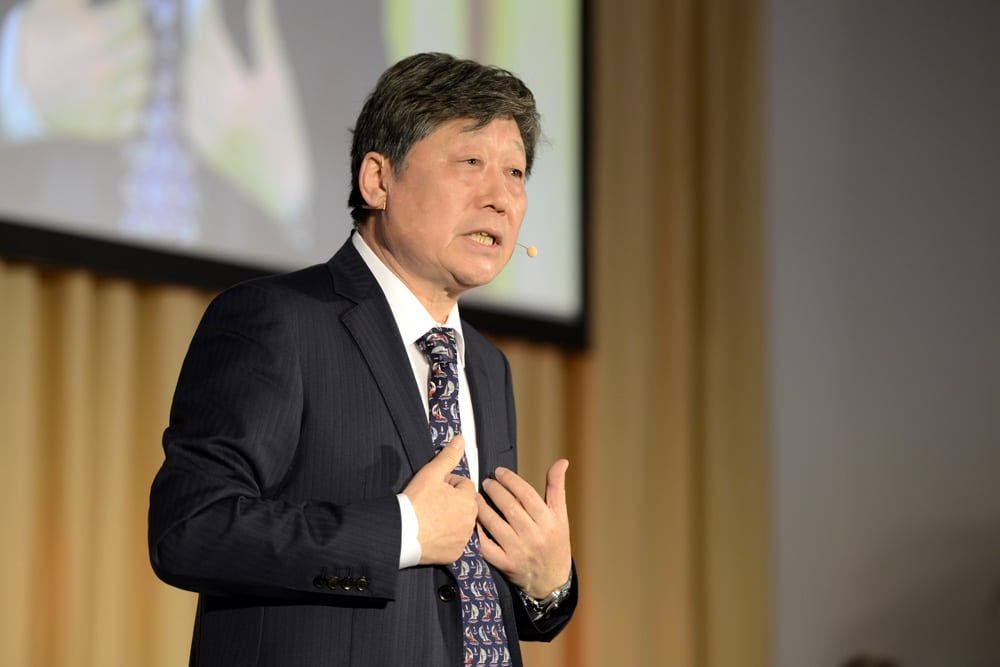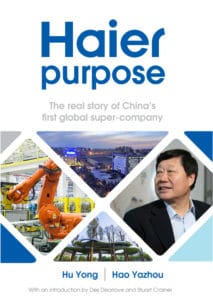
In 1984, the Chinese company Haier signed a refrigerator manufacturing technology contract with the German company Liebherr. Later in that year, Haier CEO Zhang Ruimin left China for the first time to visit the company’s new German partner.
At a German supermarket, Zhang saw no Chinese-made goods. His trip coincided with a local festival. The German accompanying Zhang pointed to the fireworks and said: ‘Those were imported from your country’. Zhang’s blood started to boil when he heard that. Would Chinese people always have to rely on the four great inventions of our ancestors?
During the same period of time, Liu Chuanzhi, Lenovo’s president wrote about his perceptions of Europe and America, where he went to study: ‘In a supermarket, Italian shoes and those of other countries were placed on the fine shelves, with prices of hundreds of dollars. Chinese shoes were just thrown in a cardboard box, one dollar for one pair. Asians in the United States tended to work for companies engaged in making small, cheap items. In general, there is only one shareholder in those companies, because they do not want to cooperate with others to build anything great.’
After the years of economic backwardness and seclusion, a huge gap between China and the world had emerged. This shocked Zhang and Liu and their sense of grievance drove the business leaders towards entrepreneurship. They separately created ambitious plans to build a Chinese brand.
Says Zhang:
It was very interesting at the time. The approval was granted by the Ministry of Light Industry to introduce a refrigerator production line with an annual output capacity of 50,000 units, I did not dare to say this when I went abroad. A production line of 50,000 units per year, what kind of concept was that? In Germany, we made a tour of Siemens, and we saw millions of units under production. In the 1980s when we saw the Siemens factory we were astonished to find that the workshop was accessed by train. The refrigerators followed along the production line, and when completed they went directly into the train cars for transport by rail. This was the line to Hamburg, that was the line to Berlin and so on. At that time, I simply felt that our factory counted for nothing.
With the very little amount of foreign exchange officially approved, only 4.6 million Deutschmarks, I wondered what equipment I could buy. Later, several pieces of key equipment were introduced, but all the automatic doors required were removed. At that time in China we did not use automatic feeding, as it was all done by hand, since we have a lot of people. The imported equipment was just a small part of the process of turning our workshop into a small production line.
My other impression of the Germans was that they were meticulous with regards to quality. Because they had clear processes, if there was even a little defect on a refrigerator on the production line, it was pulled out; even sometimes when I couldn’t see the actual flaw, the workers would still take it out. Substandard items were repaired, repolished and then returned to the line.
Another impression I had at that time was that Germany was such an advanced country, but look, what were their workers doing? When I visited the factory, I saw people who I was told were new workers. What were they doing? With a pair of pliers in hand, they were given a piece of steel and were asked to file it smooth. These were the basic fitter skills I needed when I worked in factories myself. We used to think that West Germany was so advanced that they would not need these things. I was told that these technicians were training in all the skills, so that they would have the ability to do whatever was required of them.
Then I compared what I saw in West Germany with what I saw later in Japan. I felt that their quality management really was not the same. The quality management in Japan, including Toyota’s Kanban, mainly focused on team organization. The team all worked together to improve quality, the next step in the process was the users. But although the Germans seemed to be working in a loose way, they are not focused around the team as the centre, it was as if the individual was the centre, and in fact each person’s skill level was very high. So the quality of Liebherr products was excellent, even today, I think they are very powerful.
 The Germans are constantly striving for perfection. You can see how Germany raised the idea of Industry 4.0, every step is very solid. The Japanese people sometimes think that it is not necessary to put so much time into certain things. They believe that as long as they can meet market demand it will be fine. So, it was a very interesting time. In our model room, there was a Liebherr refrigerator on one side, and a Japanese refrigerator on the other. The Japanese came and said that the Liebherr refrigerator was good. When the Germans came, they said that the Liebherr refrigerator was clumsy, and felt that the Japanese one was more beautiful. But when a strong German guy opened the door of the Japanese refrigerator, it deformed. He wondered how it could be acceptable. I saw it and felt the same thing. Then the Japanese came to us and saw how strong the German refrigerators were. They said that the Germans were making safes, not refrigerators.
The Germans are constantly striving for perfection. You can see how Germany raised the idea of Industry 4.0, every step is very solid. The Japanese people sometimes think that it is not necessary to put so much time into certain things. They believe that as long as they can meet market demand it will be fine. So, it was a very interesting time. In our model room, there was a Liebherr refrigerator on one side, and a Japanese refrigerator on the other. The Japanese came and said that the Liebherr refrigerator was good. When the Germans came, they said that the Liebherr refrigerator was clumsy, and felt that the Japanese one was more beautiful. But when a strong German guy opened the door of the Japanese refrigerator, it deformed. He wondered how it could be acceptable. I saw it and felt the same thing. Then the Japanese came to us and saw how strong the German refrigerators were. They said that the Germans were making safes, not refrigerators.
This is an edited extract from Haier Purpose by Hu Yong and Hao Yazhou now available from Thinkers50 and Infinite ideas.

Thinkers50 Limited
The Studio
Highfield Lane
Wargrave RG10 8PZ
United Kingdom

Thinkers50 Limited
The Studio
Highfield Lane
Wargrave RG10 8PZ
United Kingdom

Thinkers50 Limited
The Studio
Highfield Lane
Wargrave RG10 8PZ
United Kingdom
| Cookie | Duration | Description |
|---|---|---|
| LANG | 9 hours | Linkedin set this cookie to set user's preferred language. |
| nsid | session | This cookie is set by the provider PayPal to enable the PayPal payment service in the website. |
| sp_landing | 1 day | The sp_landing is set by Spotify to implement audio content from Spotify on the website and also registers information on user interaction related to the audio content. |
| sp_t | 1 year | The sp_t cookie is set by Spotify to implement audio content from Spotify on the website and also registers information on user interaction related to the audio content. |
| tsrce | 3 days | PayPal sets this cookie to enable the PayPal payment service in the website. |
| x-pp-s | session | PayPal sets this cookie to process payments on the site. |
| __cf_bm | 30 minutes | This cookie, set by Cloudflare, is used to support Cloudflare Bot Management. |
| Cookie | Duration | Description |
|---|---|---|
| l7_az | 30 minutes | This cookie is necessary for the PayPal login-function on the website. |
| Cookie | Duration | Description |
|---|---|---|
| CONSENT | 2 years | YouTube sets this cookie via embedded youtube-videos and registers anonymous statistical data. |
| _ga | 2 years | The _ga cookie, installed by Google Analytics, calculates visitor, session and campaign data and also keeps track of site usage for the site's analytics report. The cookie stores information anonymously and assigns a randomly generated number to recognize unique visitors. |
| _gat_gtag_UA_10408481_1 | 1 minute | Set by Google to distinguish users. |
| _ga_ZP8HQ8RZXS | 2 years | This cookie is installed by Google Analytics. |
| _gid | 1 day | Installed by Google Analytics, _gid cookie stores information on how visitors use a website, while also creating an analytics report of the website's performance. Some of the data that are collected include the number of visitors, their source, and the pages they visit anonymously. |
| Cookie | Duration | Description |
|---|---|---|
| NID | 6 months | NID cookie, set by Google, is used for advertising purposes; to limit the number of times the user sees an ad, to mute unwanted ads, and to measure the effectiveness of ads. |
| test_cookie | 15 minutes | The test_cookie is set by doubleclick.net and is used to determine if the user's browser supports cookies. |
| VISITOR_INFO1_LIVE | 5 months 27 days | A cookie set by YouTube to measure bandwidth that determines whether the user gets the new or old player interface. |
| YSC | session | YSC cookie is set by Youtube and is used to track the views of embedded videos on Youtube pages. |
| yt-remote-connected-devices | never | YouTube sets this cookie to store the video preferences of the user using embedded YouTube video. |
| yt-remote-device-id | never | YouTube sets this cookie to store the video preferences of the user using embedded YouTube video. |
| yt.innertube::nextId | never | This cookie, set by YouTube, registers a unique ID to store data on what videos from YouTube the user has seen. |
| yt.innertube::requests | never | This cookie, set by YouTube, registers a unique ID to store data on what videos from YouTube the user has seen. |
| Cookie | Duration | Description |
|---|---|---|
| DEVICE_INFO | 5 months 27 days | No description |
| loglevel | never | No description available. |
| m | 2 years | No description available. |
Thinkers50 Limited has updated its Privacy Policy on 28 March 2024 with several amendments and additions to the previous version, to fully incorporate to the text information required by current applicable date protection regulation. Processing of the personal data of Thinkers50’s customers, potential customers and other stakeholders has not been changed essentially, but the texts have been clarified and amended to give more detailed information of the processing activities.